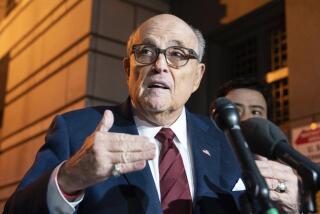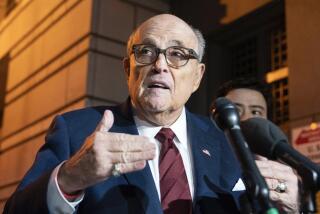Lawyer Creatively Puts Chapter 13 to Work on Behalf of Needy Clients
- Share via
PHILADELPHIA — The massive 1978 reform of the bankruptcy laws continues to lend useful protections to lower-income debtors. And perhaps no one in the country has seized on those provisions as masterfully as Henry Sommer.
As a lawyer with Philadelphia Community Legal Services, Sommer has become an authority on applying the consumer bankruptcy rules to the myriad indignities and threats faced by people without means.
As an elevated train rumbles past his office in a poor section of northeast Philadelphia, Sommer gestures toward the ranks of tiny row houses visible through the window. For their tenants and owners, even a temporary financial crisis born of a layoff or disability can mean not a modest change in life style but a headlong pitch into poverty.
“The clients I have in Chapter 13 (bankruptcy) are scraping just to pay their mortgages, much less their unsecured creditors (such as credit card issuers and retail stores),” Sommer says.
The new law, for example, established beyond doubt a point that Sommer had been trying to make for years in local courts: Utilities may not refuse or discontinue service to customers for their failure to pay bills discharged in bankruptcy.
Sommer has also successfully fought evictions by public housing agencies of clients whose back rents had been discharged in bankruptcy. Because the new law included a provision prohibiting discrimination by any government agency against anyone who had declared bankruptcy, Sommer was able to challenge a Pennsylvania rule imposing special financial requirements on low-income drivers on pain of revoking their drivers’ licenses.
Helps Welfare Lawyers
The new law also improved the arsenal of welfare lawyers. Sommer found it useful, for example, in fighting the attempts of the Social Security Administration and local welfare agencies to recover overpayments from clients--often by deducting the amounts from future benefits that themselves keep recipients at barely subsistence level. Under the new law, those overpayments cannot be recovered from people who discharged them in bankruptcy.
Perhaps Sommer’s most creative use of bankruptcy involves fighting the finance companies that prey on the owners of the modest homes, some still only worth $5,000 to $10,000, that fill the view from his office window.
One such ruling involved the bankruptcy of Cora Russell, a middle-aged former self-service laundry operator so overwhelmed with accumulated debts that she faced losing her house to foreclosure over back taxes and delinquent sewer and water fees.
One day in 1982, she had picked Fidelity Consumer Discount Co. out of the Yellow Pages. After a couple of visits to the finance company’s office, she had signed a sheaf of loan papers its own clerks prepared and taken out a $7,000 mortgage to pay her bills.
By last February, strapped again, Russell filed for bankruptcy. Fidelity filed a claim of $14,700, making it by far her largest creditor. But the bankruptcy law gave Bankruptcy Judge David Scholl the authority to hear evidence on how Fidelity had calculated its claim. What Scholl heard was not pleasing.
Fidelity had been charging Russell interest of 33%, a rate not only undisclosed but illegal, he found. It had charged undisclosed finance fees. It had imposed a secret $300 broker’s fee. In filing its claim, Fidelity appeared to have even made a significant arithmetic error in its own favor.
Tables Were Turned
In short, the firm appeared to have violated two federal regulatory laws and the Pennsylvania usury law, allowing Scholl to recompute the debtor’s and creditor’s obligations to one another. When he was done assessing treble damages against Fidelity for its violations, Russell no longer owed the company $14,700. It owed her $8,500.
Scholl’s ruling, of course, distressed Fidelity’s president, Jerry L. Silver, who calls it “a horrible decision with no basis in fact” and adds that it is under appeal.
But Scholl positively reveled in his authority to apply the bankruptcy act so broadly. “It is not in the least disturbing to us,” he concluded his 50-page opinion, “to see (Fidelity) victimized by its own greed.”
More to Read
Inside the business of entertainment
The Wide Shot brings you news, analysis and insights on everything from streaming wars to production — and what it all means for the future.
You may occasionally receive promotional content from the Los Angeles Times.










